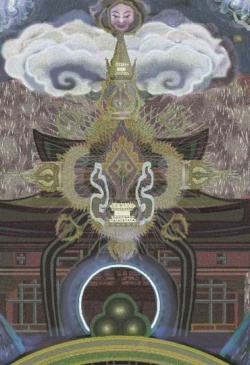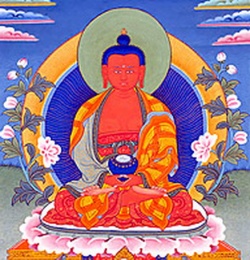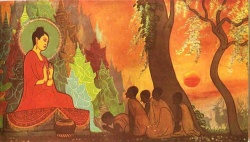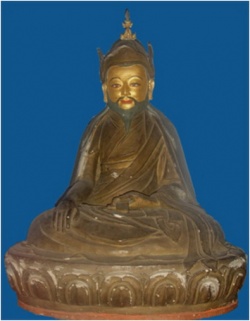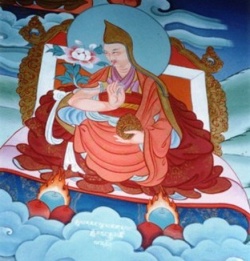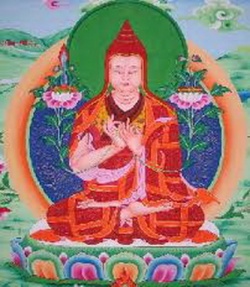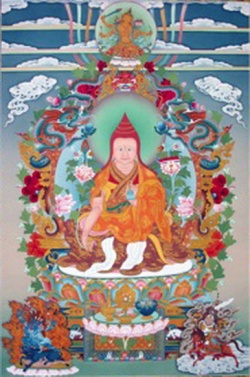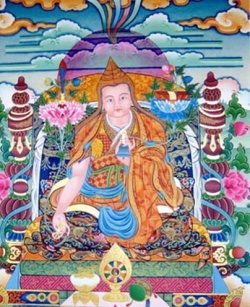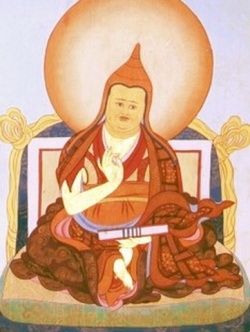Verses of the Eight Noble Auspicious Ones
The Verses of the Eight Noble Auspicious Ones (Tib. འཕགས་ཕ་བཀྲ་ཤིས་བརྒྱད་པའི་ཚིགས་སུ་བཅད་པ་, Wyl. ‘phags pa bkra shis brgyad pa’i tshigs su bcad pa) were written down in 1896 by Jampal Gyepé Dorjé (Tib. འཇམ་དཔལ་དགྱེས་པའི་རྡོ་རྗེ་, Wyl. ‘jam dpal dgyes pa’i rdo rje), otherwise known as Jamgön Mipham Gyatso or Ju Mipham Rinpoche (1846-1912)—a great Nyingma master and writer of the last century—based on a sutra with a similar title, The Sutra of Eightfold Auspiciousness.[1] Mipham also wrote a short commentary on the prayer.
These verses of auspiciousness invoke the power of goodness exemplified by the buddhas and bodhisattvas, so that any harm or obstacles may be overcome. As it says in the colophon to the prayer:
- If you recite this upon waking, all the tasks of the day will be accomplished. If you recite it when going to sleep, it will bring you good dreams. If you recite it when entering battle, it will bring total victory. If you recite it at the outset of a project, all aims and wishes will be fulfilled. If you recite it continually, you will enjoy a long life, glory, renown, prosperity, auspiciousness, abundant happiness and positivity, and the fulfilment of all wishes; all your misdeeds and obscurations will be purified, and you will achieve the higher realms and liberation. This was declared by the sublime victorious one himself.
In more detail, these verses invoke and pay homage to:
- the Three Jewels,
- the Eight Sugatas[2],
- the eight great bodhisattvas, each holding their emblem,
- the eight offering goddesses, each holding one of the eight auspicious symbols, and
- the Eight Guardians of the World, each one holding their divine emblem.
Tibetan Texts in Mipham’s Collected Works (digital version)
- Prayer: འཕགས་པ་བཀྲ་ཤིས་བརྒྱད་པའི་ཚིགས་སུ་བཅད་པ་, ‘phags pa bkra shis brgyad pa’i tshigs su bcad pa – Vol. 1, pp.1-4
- Commentary: བཀྲ་ཤིས་བརྒྱད་པའི་དོན་བཤད་, bkra shis brgyad pa’i don bshad – Vol. 1, pp.5-12
Footnotes
- ↑ Tib. འཕགས་པ་བརྐ་ཤིས་བརྒྱད་བ་ཐེག་པ་ཆེན་པོའི་མདོ་, Wyl. ‘phags pa bkra shis brgyad bzhes bya ba theg pa chen po’i mdo; Skt. Mangalastaka sutra – (Kangyur) Derge Edition - Vol. 68 pp.104-108.
- ↑ As explained in The Sutra of Eightfold Auspiciousness, there is power in reciting the names of these particular eight buddhas because their aspirations were quite extraordinary, and their buddha realms are exceptionally pure.
See Also
External Links
Source
RigpaWiki:Verses of the Eight Noble Auspicious Ones
༄༅། །འཕགས་པ་བཀྲ་ཤིས་བརྒྱད་པའི་ཚིགས་སུ་བཅད་པ་བཞུགས་སོ། །
The Verses of the Eight Noble Auspicious Ones
by Jamgön Mipham Rinpoche
ལས་གང་ཞིག་རྩོམ་པ་ན་ཐོག་མར་འདི་ཚར་གཅིག་བརྗོད་ན་གྲུབ་པ་བདེ་བ་ཡིད་བཞིན་དུ་བྱེད་པར་འགྱུར་བས་ཅི་ནས་ཡིད་ལ་བྱའོ། །
It is very important to recite this through once before starting on any activity; whatever the project, it will work out exactly as you wish.
ཨོཾ། སྣང་སྲིད་རྣམ་དག་རང་བཞིན་ལྷུན་གྲུབ་པའི། །
om, nangsi namdak rangshyin lhündrubpé
Oṃ! Homage to the Buddha, Dharma and Noble Saṅgha—
བཀྲ་ཤིས་ཕྱོགས་བཅུའི་ཞིང་ན་བཞུགས་པ་ཡི། །
tashi chok chü shying na shyukpa yi
All that dwell in the auspicious realms of the ten directions,
སངས་རྒྱས་ཆོས་དང་དགེ་འདུན་འཕགས་པའི་ཚོགས། །
sangye chö dang gendün pakpé tsok
Where appearance and existence is completely pure, its nature spontaneously perfect,
ཀུན་ལ་ཕྱག་འཚལ་བདག་ཅག་བཀྲ་ཤིས་ཤོག །
kün la chaktsal dakchak tashi shok
May everything be auspicious for us all!
སྒྲོན་མེའི་རྒྱལ་པོ་རྩལ་བརྟན་དོན་གྲུབ་དགོངས། །
drönmé gyalpo tsalten döndrup gong
Drönmé Gyalpo,Tsalten Döndrup Gong,
བྱམས་པའི་རྒྱན་དཔལ་དགེ་གྲགས་དཔལ་དམ་པ། །
jampé gyen pal gedrak paldampa
Jampé Gyen Pal, Gedrak Paldampa,
ཀུན་ལ་དགོངས་པ་རྒྱ་ཆེར་གྲགས་པ་ཅན། །
künla gongpa gyacher drakpa chen
Künla Gongpa Gyacher Drakpa Chen,
ལྷུན་པོ་ལྟར་འཕགས་རྩལ་གྲགས་དཔལ་དང་ནི། །
lhünpo tar paktsal drakpal dang ni
Lhünpo Tar Paktsal Drakpal,
སེམས་ཅན་ཐམས་ཅད་ལ་དགོངས་གྲགས་པའི་དཔལ། །
semchen tamchela gong drakpé pal
Semchen Tamchela Gong Drakpé Pal,
ཡིད་ཚིམ་མཛད་པ་རྩལ་རབ་གྲགས་དཔལ་ཏེ། །
yitsim dzepa tsal rab drakpal té
Yitsim Dzepa Tsal Rap Drakpal—
མཚན་ཙམ་ཐོས་པའི་བཀྲ་ཤིས་དཔལ་འཕེལ་བ། །
tsen tsam töpé tashi pal pelwa
Homage to you, the Eight Sugatas,1
བདེ་བར་གཤེགས་པ་བརྒྱད་ལ་ཕྱག་འཚལ་ལོ། །
dewar shekpa gyé la chaktsal lo
Merely hearing your names increases auspiciousness and success!
འཇམ་དཔལ་གཞོན་ནུ་དཔལ་ལྡན་རྡོ་རྗེ་འཛིན། །
jampal shyönnu palden dorje dzin
Youthful Mañjuśrī, glorious Vajrapāṇi,
སྤྱན་རས་གཟིགས་དབང་མགོན་པོ་བྱམས་པའི་དཔལ། །
chenrezik wang gönpo jampé pal
Lord Avalokiteśvara, protector Maitreya,
ས་ཡི་སྙིང་པོ་སྒྲིབ་པ་རྣམ་པར་སེལ། །
sa yi nyingpo dribpa nampar sel
Kṣitigarbha, Nivāraṇaviṣkambhin,
ནམ་མཁའི་སྙིང་པོ་འཕགས་མཆོག་ཀུན་ཏུ་བཟང་། །
namkhé nyingpo pakchok kuntuzang
Ākāśagarbha, and Samantabhadra noblest of all—
ཨུཏྤལ་རྡོ་རྗེ་པད་དཀར་ཀླུ་ཤིང་དང་། །
utpal dorje pekar lushing dang
Utpala flower, vajra, white lotus, nāga-tree,
ནོར་བུ་ཟླ་བ་རལ་གྲི་ཉི་མ་ཡི། །
norbu dawa raldri nyima yi
Jewel, moon, sword and sun—
ཕྱག་མཚན་ལེགས་བསྣམས་བཀྲ་ཤིས་དཔལ་གྱི་མཆོག །
chaktsen lek nam tashi pal gyi chok
Gracefully holding your emblems, and supreme in granting auspiciousness and success,
བྱང་ཆུབ་སེམས་དཔའ་བརྒྱད་ལ་ཕྱག་འཚལ་ལོ། །
changchub sempa gyé la chaktsal lo
Homage to you, the Eight Bodhisattvas!
རིན་ཆེན་གདུགས་མཆོག་བཀྲ་ཤིས་གསེར་གྱི་ཉ། །
rinchen duk chok tashi ser gyi nya
The most precious umbrella, the auspicious golden fishes,
འདོད་འབྱུང་བུམ་བཟང་ཡིད་འོང་ཀ་མ་ལ། །
dö jung bum zang yi ong kamala
The wish-fulfilling vase of goodness, the exquisite kamala flower,
སྙན་གྲགས་དུང་དང་ཕུན་ཚོགས་དཔལ་བེའུ། །
nyendrak dung dang püntsok pal be'u
The conch of fame and glory, the glorious knot of prosperity,
མི་ནུབ་རྒྱལ་མཚན་དབང་བསྒྱུར་འཁོར་ལོ་སྟེ། །
minub gyaltsen wanggyur khorlo té
The eternal banner of victory and the all-powerful wheel:
རིན་ཆེན་རྟགས་མཆོག་བརྒྱད་ཀྱི་ཕྱག་མཚན་ཅན། །
rinchen tak chok gyé kyi chaktsen chen
Holding these eight most precious emblems
ཕྱོགས་དུས་རྒྱལ་བ་མཆོད་ཅིང་དགྱེས་བསྐྱེད་མ། །
chok dü gyalwa chö ching gyé kyema
Are the creators of delight, making offerings to the buddhas of all directions and times.
སྒེག་སོགས་ངོ་བོ་དྲན་པའི་དཔལ་སྤེལ་བའི། །
gek sok ngowo drenpé pal pelwé
Homage to you, the Eight Auspicious Goddesses—Beauty, Garlands, Song, Dance, Flowers, Incense, Light and Perfume—
བཀྲ་ཤིས་ལྷ་མོ་བརྒྱད་ལ་ཕྱག་འཚལ་ལོ། །
tashi lhamo gyé la chaktsal lo
Merely thinking of you makes success grow more and more!
ཚངས་པ་ཆེན་པོ་བདེ་འབྱུང་སྲེད་མེད་བུ། །
tsangpa chenpo dejung semebu
Mighty Brahmā, Śiva 2 and Viṣṇu,
མིག་སྟོང་ལྡན་དང་རྒྱལ་པོ་ཡུལ་འཁོར་སྲུང་། །
mik tong den dang gyalpo yulkhor sung
Indra the Thousand-Eyed, the Kings Dhṛtarāṣṭra,
འཕགས་སྐྱེས་པོ་དང་ཀླུ་དབང་མིག་མི་བཟང་། །
pak kyepo dang luwang mikmizang
Virūdhaka, Virūpakṣa the Lord of Nāgas,
རྣམ་ཐོས་སྲས་ཏེ་ལྷ་རྫས་འཁོར་ལོ་དང་། །
namtösé té lhadzé khorlo dang
And Vaiśravaṇa—each one holding your divine emblem:
ཏྲི་ཤུ་ལ་དང་མདུང་ཐུང་རྡོ་རྗེ་ཅན། །
trishula dang dungtung dorje chen
Wheel, trident, lance, vajra,
པི་ཝཾ་རལ་གྲི་མཆོད་རྟེན་རྒྱལ་མཚན་འཛིན། །
piwam raldri chöten gyaltsen dzin
Vīṇā, sword, stūpa and banner of victory—
ས་གསུམ་གནས་སུ་དགེ་ལེགས་བཀྲ་ཤིས་སྤེལ། །
sa sum né su gelek tashi pel
Homage to you, the Eight Guardians of the World,
འཇིག་རྟེན་སྐྱོང་བ་བརྒྱད་ལ་ཕྱག་འཚལ་ལོ། །
jikten kyongwa gyé la chaktsal lo
Who make auspiciousness and positivity grow in the three realms!
བདག་ཅག་དེང་འདིར་བྱ་བ་རྩོམ་པ་ལ། །
dakchak deng dir jawa tsompa la
With all obstacles and harmful influences pacified,
གེགས་དང་ཉེ་བར་འཚེ་བ་ཀུན་ཞི་ནས། །
gek dang nyewar tsewa kün shyi né
May the work we are now about to begin
འདོད་དོན་དཔལ་འཕེལ་བསམ་དོན་ཡིད་བཞིན་འགྲུབ། །
dödön pal pel samdön yishyin drub
Meet with ever-growing fulfilment and success, and
བཀྲ་ཤིས་བདེ་ལེགས་ཕུན་སུམ་ཚོགས་པར་ཤོག །
tashi delek pünsum tsokpar shok
Bring good fortune, prosperity, happiness and peace!
ལྡང་ཚེ་བརྗོད་ན་དེ་ཉིན་དོན་ཀུན་འགྲུབ། །ཉལ་ཚེ་བརྗོད་ན་རྨི་ལམ་བཟང་པོ་མཐོང༌། །གཡུལ་དུ་འཇུག་ཚེ་བརྗོད་ན་ཕྱོགས་ལས་རྒྱལ། །བྱ་བ་རྩོམ་དུས་བརྗོད་ན་འདོད་དོན་འཕེལ། །རྒྱུན་དུ་བརྗོད་ན་ཚེ་དཔལ་གྲགས་འབྱོར་ཤིས། །བདེ་ལེགས་ཕུན་ཚོགས་བསམ་དོན་ཡིད་བཞིན་འགྲུབ། །སྡིག་སྒྲིབ་ཀུན་བྱང་མངོན་མཐོ་ངེས་ལེགས་ཀྱི། །དོན་ཀུན་འགྲུབ་པ་རྒྱལ་བ་མཆོག་གིས་གསུངས། །རབ་ཚེས་མེ་སྤྲེལ་ཟླ་བ་གསུམ་པའི་ཚེས་གསུམ་གཟའ་ཉི་མ་དང་རྒྱུ་སྐར་རྒྱལ་གྱི་དུས་བཟང་པོའི་ཆ་ལ་འཇམ་དཔལ་དགྱེས་པའི་རྡོ་རྗེའི་ཡིད་མཚོ་ལས་བྱུང་བའི་ནོར་བུའི་དོ་ཤལ་ཆེན་པོའོ། །
“Recite this prayer when you wake up, and you will accomplish all your aims for the day. Recite it when you go to sleep, and you will have good dreams. Recite it before a conflict, and you will be completely victorious. Recite it when you embark on any project, and you will be successful. If you recite this prayer every day, the length of your life, your splendour, renown, and wealth will all increase, you will find perfect happiness, you will accomplish your aims exactly as you wish, all harmful actions and obscurations will be purified and all your wishes for higher realms, liberation and omniscience will be fulfilled.” These are the words of the Buddha himself.
This prayer arose from the lake of Jampal Gyepé Dorje’s mind on the third day of the third month of the Fire Monkey year (1896), an auspicious time according to the configuration of planets, sun and constellations.
Mangalaṃ!
↑ King of Lamps, Steadfast and Powerful One whose Vision Fulfils all Aims, Glorious Ornament of Love, Sacred Splendour Renowned for Virtue, The One whose Concern for All Brings him Universal Renown, Glorious One as Renowned as Mount Meru in Eminence and Might, Glorious One Renowned as Caring for All Sentient Beings, And Glorious One Renowned as Most Powerful in Satisfying Wishes.
↑ In this verse, Shiva is given the name Shambhu and Viṣṇu is called Nārāyaṇa.



